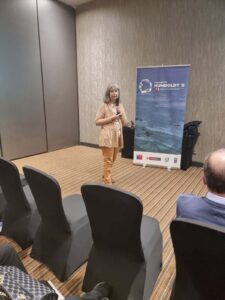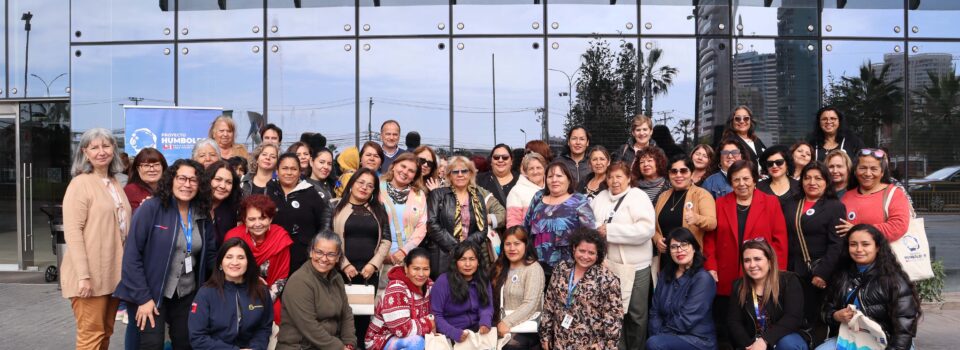IFOP participates in a women’s meeting on artisanal fishing and related activities in the Norte Grande
September 24th, 2024 More than 50 women from different coves in the regions of Arica and Parinacota, Tarapacá and Antofagasta met to share their experiences and learnings in artisanal fishing
More than 50 women from different coves in the regions of Arica and Parinacota, Tarapacá and Antofagasta met to share their experiences and learnings in artisanal fishing
With the purpose of promoting the empowerment of women and making visible their multiple contributions in the artisanal fishing sector and related activities, the Humboldt II Project, a binational Chile-Peru initiative co-financed by the GEF and executed by the Undersecretariat of Fisheries and Aquaculture of Chile and the Vice Ministry of Fisheries and Aquaculture of Peru, and implemented by the United Nations Development Program (UNDP), together with the Chilean partner institutions of the project: National Fisheries and Aquaculture Service (SERNAPESCA), the National Institute for Sustainable Development of Artisanal Fishing and Small-Scale Aquaculture (INDESPA) and the Fisheries Development Institute (IFOP), organized on September 4, a Meeting of Women in Artisanal Fishing and Related Activities in Iquique.
The meeting was attended by more than 50 women who collect seaweed, shellfish, fisherwomen, fish farmers, filleting women, marketers and other related activities, from the coves of Arica, Pisagua, Caramucho, Cavancha, Riquelme, Los Verdes, Río Seco, Chanavaya, Chanavayita, San Marcos, Chipana, Cañamo and Coloso. As part of the activity, the women made presentations where they shared their visions, experiences and the challenges they face in the fishing sector in their localities.
Various regional authorities attended along with them. The welcoming words were given by Karen Guissen, Zonal Director of Fishing and Aquaculture, Regions of Arica and Parinacota, Tarapacá and Antofagasta, who highlighted the sectoral advances in the incorporation of the gender approach. Leonardo Llanos, Executive Director of INDESPA, highlighted the fact that in 2023, they implemented a gender equality strategy in their organization, which has allowed them to design specific instruments for women and create opportunities and spaces that allow them to develop and become visible. For his part, Alejandro Gertosio, Binational Coordinator of the Humboldt II Project, stressed the importance of these spaces for meeting and exchange between women, which the Project has promoted with beneficiaries from the Atacama and Coquimbo regions, as well as in the intervention areas in Peru. He highlighted that: “These initiatives are vital spaces to make visible the challenges and challenges of women of the sea, allowing them to be addressed by the different instances of the fishing institutionality.”
During the activity, leaders and representatives of artisanal fishing organizations and related activities gave presentations on their experiences, challenges and achievements in fishing activity. They highlighted the importance of valuing and supporting women who play an essential role in artisanal fishing, stressing the need to provide them with more training and education spaces.
Along with them, representatives and specialists from the fishing institutions shared the progress that, from their respective institutions, is being made to incorporate the gender approach and the empowerment of women in artisanal fishing. In this context, presentations were made by the Zonal Director of Fishing and Aquaculture of the regions of Arica and Parinacota in Antofagasta, a SERNAPESCA specialist from the central office (Valparaíso) and the gender officer of INDESPA. The topics presented were about artisanal fishing records, related activities and the importance of women’s participation in production development and technical assistance programs.
It should be noted that, along with the topics presented associated with current regulations, it was considered important to contribute to the training of women in matters related to the care of resources, where they are relevant actors in the various coves. In this context, Nancy Barahona Toledo, Senior Researcher at IFOP and focal point on Gender for this project, made a presentation referring to the elements to be considered in the sustainability of fishery resources, focusing her presentation on the reproductive aspects and life cycle of four important resources in the far north: locate, huiros, northern octopus and anchovy.
The workshop concluded with a dynamic in which the participants, representatives of the artisanal fishing sector, identified the main difficulties they face, such as limited access to training and information, lack of recognition of their work and low presence in decision-making processes. Possible solutions were addressed to enhance the visibility and empowerment of women, including the creation of support networks and the implementation of specific training programs. This activity facilitated a valuable exchange of experiences and the generation of collaborative proposals to promote greater inclusion and greater gender equity in artisanal fishing.
Press related links:
